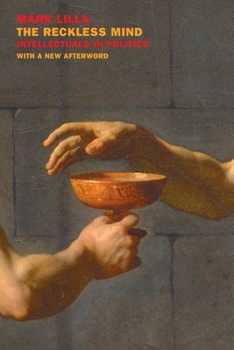The Reckless Mind: Intellectuals in Politics: Revised Edition
Select Format
Select Condition 
Book Overview
European history of the past century is full of examples of philosophers, writers, and jurists who, whether they lived in democratic, communist, or fascist societies, supported and defended... This description may be from another edition of this product.
Format:Paperback
Language:English
ISBN:1681371162
ISBN13:9781681371160
Release Date:September 2016
Publisher:New York Review of Books
Length:248 Pages
Weight:0.67 lbs.
Dimensions:0.6" x 5.4" x 8.2"
Customer Reviews
5 ratings
Worth buying just for the Afterword
Published by Thriftbooks.com User , 14 years ago
This is a wonderful, beautifully written book. Worth buying just for the Afterword about Plato's political meddling, "The Lure of Syracuse."
don't get confused by Arendt's love of Heidegger
Published by Thriftbooks.com User , 17 years ago
Arendt should certainly not be classed in with intellectuals enamored to fanatical, homicidal philosophies but an ardent, perceptive and acute critic of those philosophies. Arendt's attitude towards Heidegger can't be confused with support for actual tyranny. She may have found appealing aspects of Heidegger's philosophy that may have in turn justified tyranny and may have been blind to Heidegger's weaknesses, but she never slipped into rationalizing or justifying tyranny at all- either in her own time or in the past. Instead, Hannah Arendt was a voice of intellectual integrity and moral clarity. The same cannot be said for the intellectuals profiled in this book, which kicks derriere.
Engaging biographies of 20th Century European Intellectuals
Published by Thriftbooks.com User , 22 years ago
Mark Lilla's book aims to be both a collection of biographical sketches of influential European intellectuals of the 20th Century and a study of the disastrous attraction political power can have on on the minds of philosophers. In six chapters, each running 30-40 pages, Lilla casts the lives of Jacques Derrida, Michel Foucault, Alexandre Kojeve, Walter Benjamin, Carl Schmitt, and Martin Heidegger. Each of these thinkers, according to Lilla, at some point in their intellectual life, went astray turning from the well lit path of reason and taking up the route of "philotyranny". Lilla's book succeeds most in giving us concise, well researched, and engagingly told stories of the thinking lives of these European intellectuals. His gift for biographical narrative rivals the best profiles of the New Yorker. But Lilla succeeds less well at demonstrating the habits of thought that attract certain intellectuals to politics or making the case for the necessarily disastrous consequences of mixing political power with philosophical thinking. Nevertheless, perhaps precisely because these biographical narratives are told with Lilla's one-sided but engaging tale of "recklessness", his book serves as a good introduction to readers familiar with the names of these revered European intellectuals who have been put off by the often ponderous (and prodigious) prose describing their work. Lastly, haunting this text, but unfortunately never stepping forward as subject, is the ghost of Leo Strauss. He makes appearances in almost every chapter, as commentator or interlocutor, but the reader never benefits from Lilla's "open" and "clear" descriptive style in order to learn of this other important European emigre whose life and work parallels so many of Lilla's subjects. For an American writer ensconced at the University of Chicago, to avoid an exoteric treatment of the tutor of so many American public intellectuals (from Allan Bloom, Harry Jaffa, Joseph Cropsey, to Clarence Thomas, William Bennett and Irving Kristol) seems to deprive us of a fuller account of the attraction of intellectuals to public life. ~ J. D. Petersen
Beware ideologies
Published by Thriftbooks.com User , 23 years ago
This is an excellent book. It is as easy to read as it is insightful. Lilla does not separate the personal lives of the intellectuals from their work and analyzes the dangerous mix of philosophy and politics. Starting from the example of Plato and the Republic Lilla shows the attempts of many philosophers to take up - and fail - politics. he does not separate their lives from their conceptions of the world nad the manner in which they were unable to separate the political from the ideological. se .I found the critiques of Heidegger and Schmitt very useful, but I was especially drawn to Foucault and Derrida. Not because the otehr intellectuals in questions are less interesting but because the latter have shaped the postmodern intellectual framework that we have just recently began to question. the conclusion is masterful and makes an excellent case to fear the philotyrannical intelelctual as Lilla terms it. It is possible to read it in a weekend and I can find few books that offer such intellectual value for so little time.
Essential Reading
Published by Thriftbooks.com User , 23 years ago
Lilla is masterful in revealing the excesses and foolishness of much of what American academics find profound. The critiques of Derrida and Foucault are the best I have ever read. Derrida is shown to be a charlatan-- completely bereft of any useful insights. But the core of these essays -- the relationship of personal psychology to the philosophy/politics mix -- displays a rich and insightful intelligence at work. A must-read.





